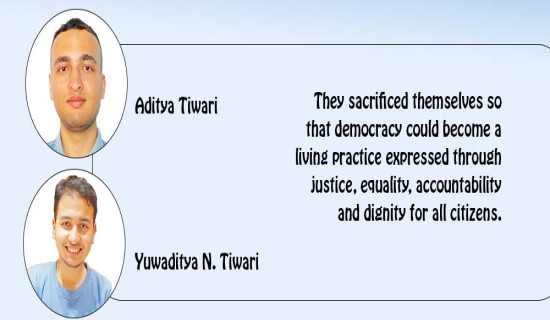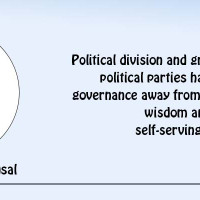- Friday, 30 January 2026
Harnessing People’s Agenda For Health
Nepal has historically progressed in the health sector in terms of providing basic healthcare services and achieving better health outcomes. High level national health polices and mid-term strategic plans are primarily targeting the poor and socially marginalised populations to ensure that their healthcare needs are adequately addressed with a provision of equitable access to quality healthcare services. Obviously, there is a clear need for harnessing people’s agenda for health in order to address their health care needs without any hardships.
While reviewing the national progress in health and population sector, it is encouraging to note that life expectancy has substantially increased over the decades. More precisely, over the fifteen years, the total fertility rate has declined to 2.1 per cent, maternal mortality rate has decreased by 47 per cent and neonatal mortality rate has fallen by 42 per cent. Similarly, child mortality has decreased by 37 per cent. These indicators reveal significant progress and offer some hopes for people’s healthy lives in the future.
Critical problems
Additionally, the universal health coverage is 53.6 per cent which is a substantial improvement compared to the last decade. Out-of-pocket expenditure has lowered to 54.2 per cent. But it is notably very high. The people especially from poor sections of the society face critical problems and challenges to afford the costs of comprehensive healthcare in both public and private hospitals.
The multi-sector nutrition actions have been effective in improving child nutrition. The stunting has now significantly reduced to 25 per cent. However, extra efforts need to be made to reduce wasting which is still a huge challenge in many remote areas where poverty, diverse socio-cultural contexts and poor health systems are notably visible.
Efforts are in place to reduce the persistent health inequalities. These are socio-economic, cultural and political barriers that profoundly affect access to and utilisation of essential health care services in health care facilities. The overarching principle of right to health is largely promoting right-based health interventions to ensure leaving no one behind for accessing healthcare. The political commitment to universal health coverage is
Despite significant achievements in the health sector, there are critical needs to better understand how the federal health system is working in Nepal. With the new structure, complex coordination mechanisms and limited capacity of the local governments to deliver basic health services, there are still pertinent questions around effective implementation of federal health policies, guidelines, or frameworks.
Undoubtedly, the limited human resources in the remote health facilities, poor health infrastructure, irregular supplies of medicines and other essential logistics are critical challenges in local health system that continue to constrain in delivering basic health services for ages to the people at large.
People’s agenda for health are consistently transforming at scale. In addition to increasing political commitments, it is encouraging to observe that existing efforts from governments and development partners are paving the way for shifting the public health towards promoting health and well-being. More recently, health promotion approaches enable all people to flourish and achieve their full physical and mental health potential throughout their lives and across generations.
More importantly, social protection services for people living with HIV, Tuberculosis and disabilities should be based on equity, inclusion and diversity. In the changed context, political leaders, private sector, development partners and civil society work together to harness people’s agenda for health. More advocacy is needed to ensure capacity of governments to provide people-centred healthcare services that promote health of people and planet in a more sustainable and equitable approach.
Apart from increasing trends of non-communicable diseases and the lessons from the natural disasters as well as COVID-19, people envision a resilient health system that promotes community engagement, multi-sector coordination and partnerships, intersectionality, social inclusion, diversity and equity in the health sector. Particular focus of the health interventions is needed for older people, women and children, poor and vulnerable populations who are often socially disadvantaged and excluded in the societies. Evidence suggests that increased social protection can protect livelihoods in future disasters and pandemics.
There are increasing expectations from people that local governments should be more accountable to ensure access to equitable quality health care services. New health budget, policy and priorities should reflect the people’s agenda for health care needs in the federal context. While reaching the unreached strategy is an ambitious intervention, local governments need to promote evidence-informed health polices and strategic actions to ensure universal access to health care for all.
Profound implications
Historically, some indigenous and ethnic communities, for example, are marginalised in the local health system and mainstream development. Furthermore, sexual and gender minorities still face stigma and discrimination in the families and communities. These local contexts have profound implications for accessing and utilising health care services. Effective implementation of pro-poor health policies, free health care and health insurance schemes can be instrumental in harnessing people’s agenda for health. Eventually, there should be no disparity between the rich and the poor in terms of accessing basic health services.
To sum up, health in all policies demands multi-sectoral engagement and partnerships for creating synergies in health outcomes. While Nepal is committed to achieving the ambitious goals of International Conference on Population and Development (ICPD) and Sustainable Development, promoting people-centred health services can yield better outcomes for health and population at large. Therefore, we need to work together to ensure health equity for social justice and sustainable human development.
(Research scholar in anthropology, Bhandari writes on health and development issues.)

















